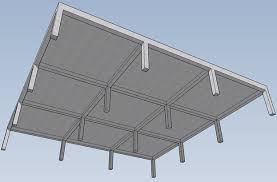The construction industry in India is evolving, and with it, the materials and techniques used to build our homes, roads, and infrastructure. One of the latest innovations making waves is Fiber Reinforced Polymer (FRP) bars. These non-corrosive, non-metallic alternatives to traditional steel rebar are set to revolutionize the way we think about reinforced concrete (RCC) structures. But what exactly are FRP bars, and why should both civil engineers and homeowners consider them for their next project?
What are FRP Bars?
FRP bars are composed of high-strength fibers, such as glass, carbon, basalt, or aramid, encapsulated in a plastic matrix made from materials like epoxy or vinyl. This combination results in a reinforcement material that boasts exceptional durability and strength without the downsides associated with steel rebar, such as corrosion and weight.
Advantages of FRP Bars
1. Corrosion Resistance: Unlike steel, FRP bars do not rust. This makes them ideal for structures exposed to moisture and chemicals, such as parking garages, chemical plants, and buildings near the sea.
2. Lightweight: FRP bars are significantly lighter than steel, which reduces transportation costs and makes handling on-site much easier.
3. High Strength-to-Weight Ratio: Despite being lightweight, FRP bars are incredibly strong, making them suitable for heavy-duty applications like highway construction and bridge deck slabs.
4. Non-Conductive: FRP bars do not conduct electricity, which can be a crucial advantage in certain industrial applications or in areas prone to lightning strikes.
Applications of FRP Bars
FRP bars can be used in a wide range of construction projects, offering benefits that go beyond just durability and strength:
- RCC Roads and Pavements: Withstanding the rigors of heavy traffic and environmental stress, FRP bars can significantly extend the lifespan of roads and pavements.
- Parking Garages- The non-corrosive nature of FRP bars ensures the longevity of parking structures, which are often exposed to moisture and de-icing salts.
- Chemical Plants: Resistant to a variety of chemicals, FRP bars are perfect for reinforcing structures in harsh industrial environments.
- Seawater Structures: For buildings and infrastructure near the ocean, FRP bars provide a robust solution to combat the corrosive effects of saltwater.
- Highway Construction: Enhancing the durability of highways, FRP bars help in reducing maintenance costs and improving safety.
- Bridge Deck Slabs and Enclosures: The high strength and corrosion resistance of FRP bars make them ideal for the demanding conditions faced by bridges.
- RCC Tanks: Used for water storage and treatment, FRP bars ensure the structural integrity and longevity of tanks.
Why Homeowners Should Consider FRP Bars
While the technical advantages of FRP bars are clear to civil engineers, homeowners also have much to gain:
- Long-Term Savings: Investing in FRP bars can reduce maintenance and repair costs over the lifespan of a building.
- Increased Property Value: Structures built with durable, innovative materials often have higher market values.
- Peace of Mind: Knowing that your home is built with materials designed to withstand environmental challenges can provide significant peace of mind.
Conclusion
The introduction of Fiber Reinforced Polymer bars into the Indian construction industry marks a significant step forward in building technology. Whether you are a civil engineer looking to specify the best materials for your projects or a homeowner planning to construct a durable, long-lasting home, FRP bars offer a compelling alternative to traditional steel rebar. With their myriad advantages, from corrosion resistance to high strength, FRP bars are poised to become a staple in modern construction, helping to build a more durable and sustainable future.
Embrace the future of construction today—consider FRP bars for your next project.
If you found this blog post informative, please share it with your friends and colleagues. Let's spread the word about the incredible benefits of FRP bars and help revolutionize the construction industry in India!
Visit Instagram page- https://www.instagram.com/civilengineeringiit/













